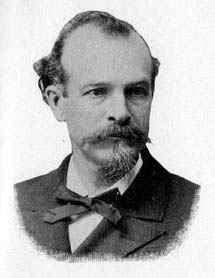Ezra P. Savage
Ezra Perin Savage | |
|---|---|
 | |
| 12th Governor of Nebraska | |
| In office May 1, 1901 – January 8, 1903 | |
| Lieutenant | Calvin F. Steele (acting) |
| Preceded by | Charles H. Dietrich |
| Succeeded by | John H. Mickey |
| 10th Lieutenant Governor of Nebraska | |
| In office January 3, 1901 – May 1, 1901 | |
| Governor | Charles H. Dietrich |
| Preceded by | Edward A. Gilbert |
| Succeeded by | Calvin F. Steele (acting) Edmund G. McGilton |
| Mayor of South Omaha, Nebraska | |
| In office 1887 | |
| Member of the Nebraska House of Representatives | |
| In office 1883 | |
| Personal details | |
| Born | April 3, 1842 Connersville, Indiana, U.S. |
| Died | January 8, 1920 (aged 77) Tacoma, Washington, U.S. |
| Political party | Republican |
| Spouses | Anna Chase Rich
(m. 1866; died 1883)Elvira Hess
(m. 1896; died 1899)Julia McCullough (m. 1899) |
Ezra Perin Savage (April 3, 1842 – January 8, 1920) was an American politician and the 12th governor of Nebraska from 1901 to 1903. He was the tenth lieutenant governor in 1901 serving under Governor Charles H. Dietrich.
Savage was born in Connersville, Indiana, but his parents moved to Iowa shortly after his birth. He graduated from high school in Davenport, Iowa and then attended Iowa College.
Career
[edit]
Savage enlisted in the Union Army as a soldier and scout at the start of the Civil War, but he was discharged due to a disability. After the war he returned to Iowa and studied law, and was admitted to the bar in 1875.[1] He moved to Nebraska in 1879 and founded Sargent, Nebraska in Custer County.[2]
In 1883, Savage was elected to the Nebraska House of Representatives, where he served two terms. After leaving office he moved to Omaha, where he became the first mayor of South Omaha in 1887. He was City Councilman in 1888. He was elected lieutenant governor in 1900.[3] Savage took over as governor of Nebraska on May 1, 1901, after the resignation of Charles H. Dietrich to fill a US Senate seat.
Savage intended to run for a second term as governor, but the criticism which was caused by his parole and pardon of former State Treasurer Joseph S. Bartley, who was serving a prison sentence for embezzlement, influenced his decision to step down from the race.[4]
Family life
[edit]Savage married three times: to Anna Chase Rich[5] in 1866, who died in 1883; to Elvira Hess in 1896, and she died in 1899; and finally to Julia McCullough in 1896, daughter of Alexander and Esther McCullough of Pennsylvania. She survived his passing and lived in Tacoma until her death in May 1941.[citation needed]
He had six children, five of them by Anna Rich, and the last, born in 1880 to Elvira Hess.[6][7]
Death
[edit]Shortly after serving out his one term as governor, Savage moved to Tacoma, Washington. He died in Tacoma and is interred at Tacoma Cemetery.
References
[edit]- ^ "Ezra P. Savage". National Governors Association. Retrieved September 18, 2012.
- ^ "Lieutenant-Governor Ezra P. Savage of Custer County". The Red Cloud Chief. October 19, 1900. p. 1.
- ^ Ezra P. Savage. The Encyclopedia of Nebraska. January 1999. ISBN 9780403098347. Retrieved September 18, 2012.
- ^ Ezra P. Savage. The Encyclopedia of Nebraska. January 1999. ISBN 9780403098347. Retrieved September 18, 2012.
- ^ US Census, birth and death records
- ^ US Census Reports
- ^ "Ezra P. Savage". National Governors Association. Retrieved September 18, 2012.
External links
[edit]- 1842 births
- 1920 deaths
- People from Connersville, Indiana
- Politicians from Davenport, Iowa
- People of Iowa in the American Civil War
- Iowa lawyers
- Nebraska lawyers
- Nebraska city council members
- Mayors of places in Nebraska
- Republican Party members of the Nebraska House of Representatives
- Republican Party governors of Nebraska
- Lieutenant governors of Nebraska
- 19th-century American lawyers

